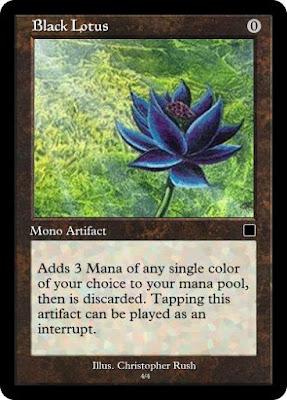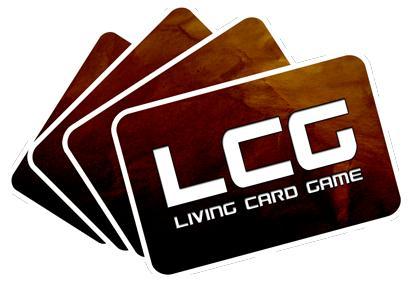Let's be clear before we begin in what a LCG is. The LCG is Fantasy Flight Games' system for distributing customisable card games. The term LCG can only be used by Fantasy Flight Games, as it is a trademarked term; other companies have started creating card games with similar distribution methods but subsequently cannot use the same name. However it is Fantasy Flight Games implementation that I want to call out.
The LCG system works by offering packs of known cards. Instead of the random booster pack concept still used by Magic: The Gathering, and the recently deceased Legend of the Five Rings, each pack of LCG cards is known and fixed. You'll also be given the maximum number of cards you can use in a deck, and on recent packs, even a QR code on the packaging that allows you to look up all the cards before you buy.
 |
| The infamous Black Lotus, the most expensive Magic Card in the game. |
LCGs also did away with the concept of rarity. Magic The Gathering uses a number of tiers of rarity and it’s often that the most powerful cards can also be the rarest. This leads to two interlinked issues, it causes a market of card values that can lead to ridiculous prices for cards and also means a pay-to-win aspect starts to creep into the game, as only those who can afford the best cards can remain competitive. With known distribution the LCG completely removes this problem; if you want a particular card you simply buy the pack that contains it.
To be fair, it's a pretty neat concept, taking the pot luck aspect out of collecting cards and completely removes problems of rarity. It was rightly hailed as a vastly superior to the random booster method but I think Fantasy Flight Games have started to abuse the system.
I started to see the cracks in my review of Warhammer 40,000 Conquest and the recent A Game of Thrones second edition is providing ammunition for my fears.
 |
| The Night's Watch are a new faction for A Game of Thrones the Card Game 2nd edition |
My worries are two-fold, that the make-up of the core sets is purposefully made to force you to buy multiple copies, and that the number of factions are so many that expansion packs are becoming increasingly spread thin, forcing you to buy a full expansion pack for a single card.
Let's start with the core set issue. The LCG core sets are made in such a way to give you the ability to try out all the factions and create balanced decks to do so. I like this idea. It acts as a great introduction to the game and allows you decide which faction is for you as well as learn the mechanics in a fair and straightforward way. But what this leads to is an uneven distribution of the cards and next to zero opportunity to customise the decks. It means that to have the full complement of useable cards you're going to need to buy multiple copies of the core set. Using Conquest as an example, you'll need three core sets to make up the full quota of usable cards. But this also leads to a huge amount of redundancy, many multiple copies of cards and tokens that can't be used.
My other issue, and the thing that's really getting me at the moment is that the large number of factions present in the recent LCGs mean that each expansion pack contains only one or two cards for each faction. And the problem is only going to get worse. Conquest started with seven factions, with Tyranids having just been released we're now looking at eight factions, and the ninth faction, Necrons, has already been announced. Each Warpack contains 60 cards, since each Warpack also contains a new commander and their retinue, take out those 9 cards and you are left with 17 different cards in each warpack, with 9 factions you'll be lucky to get two new cards for your faction.
The recent Game of Throne the Card Game Second Edition (though surely it’s the third edition?) does a similar thing. The original Game of Thrones Core Set included four factions and plenty of neutral cards. It was some time before the game was extended to six. The new core set includes eight factions, one of which, The Nights Watch, is new to the second edition. The cynic in me thinks that Fantasy Flight Games are purposefully increasing the faction count to water down the expansion packs.
There's also a heavy reliance on faction specific cards. Nearly all LCGs have neutral cards, those that can be included in any deck, but the selection of neutral cards available in recent games is thin at best. Again it feels that Fantasy Flight Games are purposefully reducing the number of neutral cards in their games to force you to collect faction cards.
Is there an alternative? AEG have shown with Doomtown Reloaded that there are better ways. Doomtown's core set contains two of every card, and you can have a maximum of four of the same card in each deck. If you want to own the full complement of cards you simply buy two core sets and end up with nearly no duplication (there are a total of four unusable cards). Doomtown also started with only four factions, and the vast majority of cards in the game aren't specific to a particular faction. There's the potential that the same problem is going to emerge as we now have six factions in the game, but again since three quarters of the cards in Doomtown can be used by any faction the issue isn't as big as it is with other games.
 |
| Doomtown Reloaded is an example of an LCG done right |
If you're a hardcore player, attending tournaments and plumbing the full depths of strategy, then I don't think is in an argument you're going to agree with. To remain competitive you're going to be purchasing every card anyway as you will no doubt be experimenting with all manner of decks and strategies. But if you play these games even remotely casually then it's a big concern.
It's because of this that I'm calling it quits for now on Conquest. I bought a single core set and every warpack in the first cycle, but I have no interest in playing Tyranids and don't want to be forced into buying two more core sets just to run three Virulent Plague Squad cards in my Nurgle deck. It's also making me think twice whether to get on board with the new Game of Thrones Card Game, with already collecting Doomtown and Conquest for the last year it's quite a financial drain and although I loved the original version, and really like the look of what they have done with the second, I can't commit to that level of collecting again.
This issue doesn't detract from the games themselves; the gameplay is still top notch, the artwork amazing and the quality superb. However, it does put me off trying these games out in the future, knowing that a significant investment in extra cards is needed to get the full experience out of the game.














.png)


0 comments:
Post a Comment